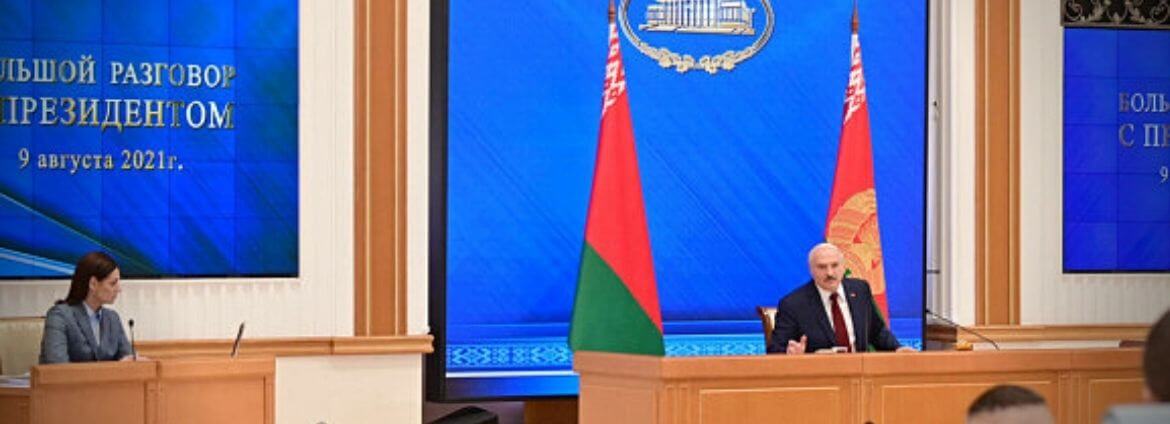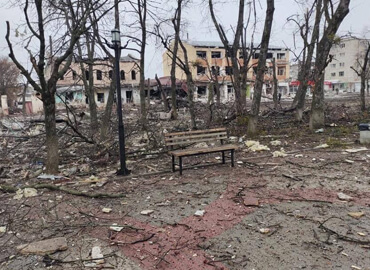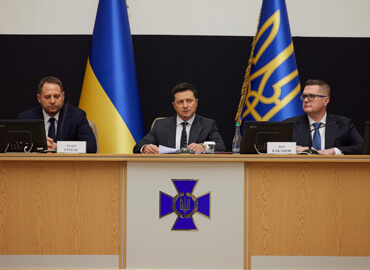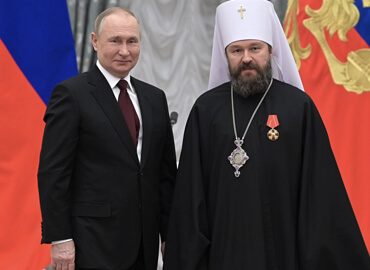Alexander Lukashenko devoted a significant part of his 8-hour «Big Conversation» to Ukraine. And he did so in his usual manner, positioning himself as the ultimate source of truth.
Over the year following the presidential elections, Belarus’s position as an independent actor in foreign policy has significantly narrowed. If earlier Lukashenko could play the situational neutrality card for external use and position himself as a «giver of stability,» then from August 2020, and even more so — after the events of May 2021, it has been getting more and more difficult for him. It seems that he has chosen the only possible way to continually remind people of his presence through exacerbating relations with all neighbors except Russia. Since August 2020, Lukashenko met with Russian President Putin 4 times, where each meeting included a discussion of financial assistance to Belarus.
If towards Lithuania, Poland, and Latvia Belarus has taken a strategy of pressure with the help of illegal migrants, Ukraine stands apart. A series of Lukashenko’s rhetorical exercises during the «Big Conversation» were dedicated to Ukraine. After making clear that relations with its neighboring state are at their lowest point, the Belarusian ruler made several bold statements. In addition to laying out his own version of the negotiations in Minsk (keeping in mind that Lukashenko only provided a platform for the Normandy Four negotiations, but was not a direct participant in them), appeals cast as Russian propaganda narratives were made to Volodymyr Zelensky. According to Lukashenko, Crimea and the Donbass are different cases that must be resolved separately, and Zelensky should fly to Donetsk and Luhansk and talk with people there. (The idea about the need for direct negotiations between the Kremlin puppets in Donbass and the government in Kyiv is far from new.) The confusion regarding the Verkhovna Rada’s adoption of the law «On the indigenous peoples of Ukraine» stems from the same desire to demonstrate loyalty to the Kremlin as stridently as possible.
One gets the sense that through attacks on Ukraine, Lukashenko is expanding his area of opportunities in relations with the Kremlin.
An interesting point is that Lukashenko published his own version of learning about the «Wagnerites» near Minsk in July last year, claiming they were seen by some attentive Belarusian who informed the KGB about suspicious individuals. Even more interesting, however, is that Lukashenko not only stressed that Roman Protasevich had not fought in Donbass, but also confirmed his interrogation by investigators from the so-called Luhansk People’s Republic (LPR). This fact may become an obvious reason for Ukraine to strengthen sanctions against Belarus.
Lukashenko promptly tried to take advantage of the death of the director of the Belarusian House Vitaly Shishov in Kyiv, serving an ultimatum in investigating his death. Lukashenka did not fail to recall that for five years the circumstances of the death of Pavel Sheremet, who also died in the Ukrainian capital, have not been disclosed, but at the same time neglected to mention that it was he who had deprived the journalist of Belarusian citizenship.
Adopting an emphatically challenging tone, Lukashenko declared his ability «together with Russia» to bring Ukraine to its knees in matters of fuel supplies and maintained he would enjoy support of 90 percent of Ukrainians. At the same time, he repeated his favorite mantra that Belarus will not attack Ukraine. One can draw their own conclusions in this context how to assess Lukashenko’s statements regarding «close cooperation between the KGB and the FSB.»
If, during his 2015-2020 presidential term, Lukashenko positioned himself as a situational ally of Ukraine (obviously with the aim of expanding room for maneuver in relations with Russia) and this made it possible to positively influence Belarus’s stance within the international community, then after August 2020, his relations with Ukraine have seriously deteriorated. At the same time, the Ukrainian authorities limit themselves to statements on the introduction of personal and sectoral sanctions against Belarus, or they unite with the West (as with the airline sanctions) when other scenarios seem politically unfeasible.
Ukraine will have to work out as quickly as possible a settled relationship with Belarus, at least within the framework of the Lublin Triangle. This presupposes an increase in pressure from sanctions, possibly leading to a reduction in trade, the balance of which is in favor of Belarus. Although Volodymyr Zelensky’s signature «big construction» program may suffer, issues of national security are more important. The approaching Russian-Belarusian Zapad-2021 exercises may become a moment of truth not only for Belarusian-Ukrainian relations, but also for the fate of Lukashenko himself. Kyiv should give up playing number two in relations with Minsk and form a strategy towards Belarus that recognizes that its democratic development is one of the cornerstones of European security.
Evgen Magda,
Institute of World Politics (Kyiv, Ukraine). The article is provided specially for Reform.by by iSANS.
Материал доступен на русском языке: «Лукавый разговор»: перспективы беларусско-украинских отношений











